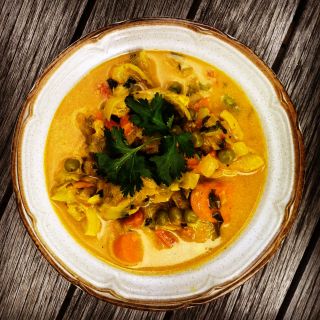Diet
Inflammatory Diet Linked to Colon Cancer, Metabolic Risk
Mediterranean diet, brimming with anti-inflammatory nutrients, offers protection
Posted October 30, 2014

My lunch: Veggie-rich chicken curry
Sometimes there’s nothing like an AICR press release to make you feel good about your lunch.
You see, only minutes before perusing the latest communique from the American Institute of Cancer Research, I had enjoyed a steaming bowl of chicken curry comprising various vegetables (carrots, onions, mushrooms, leeks, peas and Brussels sprouts), herbs and spices (fresh ginger, garlic, turmeric, chili, curry powder and fresh cilantro) and healthy fats (olive oil); no rice.
My mouth still aglow from my meal, I turned to my emails and – lo and behold – read in said press release that every food I had just eaten was a key tool in fighting inflammation and cancer. Not to boast, but I felt just a little bit pleased with myself.
New inflammation index
Chronic inflammation has long been known to be one of the key drivers of various types of cancer, as well as other disorders, such as cardiovascular disease and metabolic syndrome. It’s also been well known that certain foods – mostly, refined western fare – can increase inflammation, while others – such as vegetables, herbs, spices, and foods rich in omega-3 fatty acids, such as oily fish, and the meat, dairy and eggs from pastured animals – can calm it.
Now scientists have a tool to evaluate the inflammatory potential of people’s diets. In research presented today at the AICR’s Annual Conference, researchers showed that diets high in fiber, spices, healthy fats and carotenoids all contribute to an anti-inflammatory effect that reduces the risk of colorectal cancer.
"We know inflammation is important in carcinogenesis because experimental data support this mechanism and the use of anti-inflammatory drugs is protective," said Susan E. Steck, University of South Carolina (USC) Associate Professor, in the press release. "Now we're starting to see that diet influences inflammation and that the inflammatory potential of the diet is associated with colorectal cancer."
The USC inflammatory index of food and food components includes 45 foods, nutrients and plant chemicals. It was first developed five years ago using a global literature review of studies investigating the role of foods on one or more of six inflammatory markers, including C-reactive protein (CRP). At that time, the index based its inflammatory ranking on almost 1,000 studies.
Last year researchers updated and strengthened the inflammatory index by including 1,943 studies published through December 2010. Saturated fat and trans fat rank among the top nutrients on the pro-inflammatory list; fiber, carotenoids, turmeric, ginger and flavonoids at the bottom.
The latest study scored the inflammatory potential of 34,703 women's diets who were part of the Iowa Women's Health Study. Women were ages 55 to 69 and cancer free when they reported their dietary intake. By the end of 2010, 1,636 of the women were diagnosed with colorectal cancers, including 1,329 colon and 325 rectal cancers.
The study found that women who consumed the most pro-inflammatory diets were at 20% increased risk of colorectal cancer compared with women who consumed more anti-inflammatory diets. Green leafy vegetables, fish, fruit, nuts and whole grains were among the top foods more commonly consumed among the anti-inflammatory diet group.
Another study published last month by the USC team found that a group of police officers eating the most pro-inflammatory diet were more likely to have risk factors associated with risk of heart disease and poor metabolic health compared to those consuming an anti-inflammatory diet.
Liberating: Index evaluates whole diet, not individual foods
What’s liberating about the inflammation index is that it will encompass diets as a whole, rather than focusing on the inflammatory potential of individual foods. Taking food out of context – as is often done in research studies – bears the risk of unnecessarily demonizing individual foods, such as meat.
“If someone regularly consumes red meat but also a lot of fruits and vegetables, they might balance each other out in terms of pro- and anti-inflammatory factors," Steck explains. “Now, we know that consuming more fruits and vegetables, which are high in flavonoids and carotenoids, and moving toward a more plant-based diet will improve your dietary inflammatory index score and translate into anti-inflammatory effects."
Broken-record alert: The Mediterranean diet is the perfect antidote to inflammation. It corresponds exactly to the criteria listed above, brimming with anti-inflammatory compounds from vegetables and fruits, herbs and spices, legumes and whole grains, nuts and seeds, and healthy fats from olives, nuts and oily fish. Pro-inflammatory foods, such as red meat, refined grains, butter and alcohol, are consumed sparingly.
Studies have repeatedly shown the Mediterranean diet to be associated with lower levels of inflammation (e.g., here, here, here and here). The Western-type diet, on the other hand, which is high in red meat, high-fat dairy products, refined grains, and simple carbohydrates, has been associated with higher levels of inflammatory markers CRP and IL-6.
These findings don’t mean we all have to become vegetarians or vegans to lower inflammation and ward off cancer. It does mean, however, that we should include highly nutritious plant foods in every meal we eat,whether it’s berries for breakfast, or vegetables and salads, legumes, nuts and seeds, at all other meals. And when we eat animal foods, we should aim to obtain the highest-quality products, choosing the meat, eggs and dairy of pastured animals, and wild-caught fish.
My books, Zest for Life and Modern Mediterranean: Christmas and New Year, show how easy it is to eat a delicious, anti-inflammatory diet. More anti-inflammatory recipes are available for free on my website, www.modernmediterranean.com. And if you want easy prompts for ways to eat anti-inflammatory foods, then follow me on Instagram, where I show you what I eat.
(c) Conner Middelmann-Whitney. Conner is a nutrition coach and cookbook writer specializing in the Mediterranean diet. She is the author of Zest for Life: The Mediterranean Anti-Cancer Diet and Modern Mediterranean: Christmas and New Year. She offers Mediterranean weight-loss coaching and Mediterranean diet coaching (online and in-person) to people who want to get fit and healthy without resorting to fad diets. For more information about her work, please visit her website, www.modernmediterranean.com.




